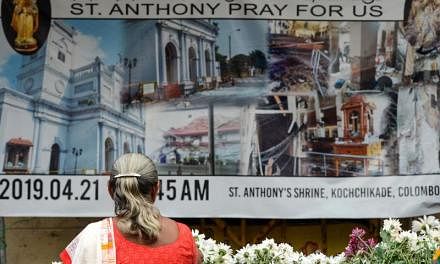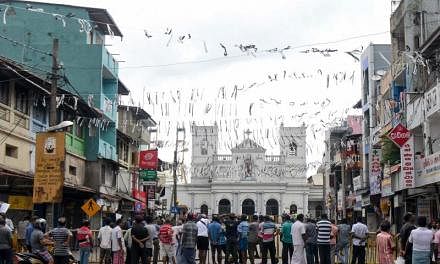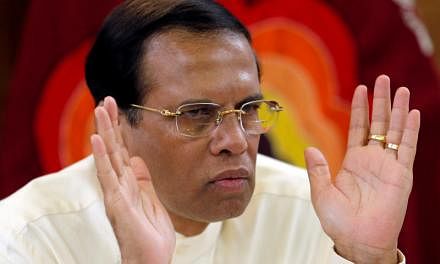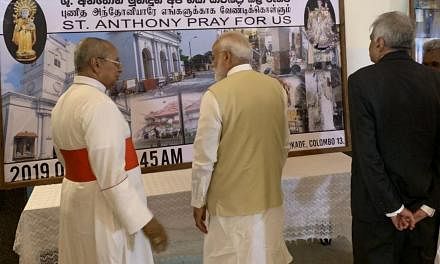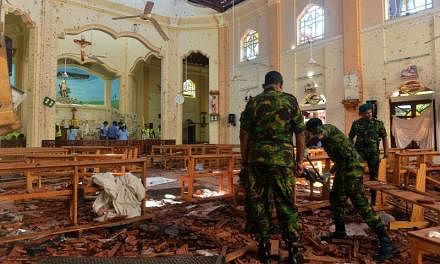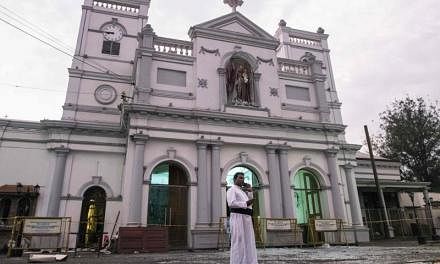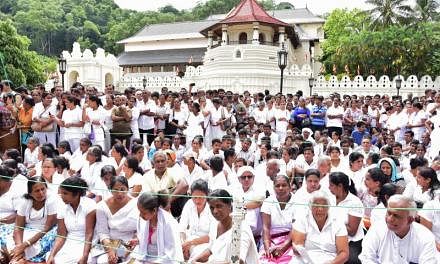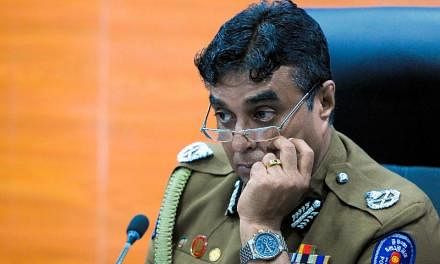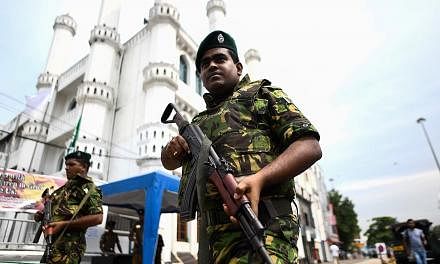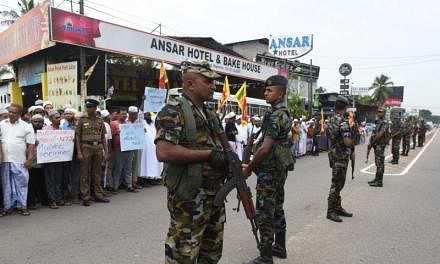COLOMBO - The explosion outside Sri Lanka's St Anthony's Church in Colombo was captured on video by a vehicle's dashboard camera on Sunday morning (April 21).
It was one of three churches hit and where one of the first explosions was reported. At least 207 have been killed in eight blasts on Easter Sunday.
The video shows fire and black smoke billowing from the church building. Vehicles are seen moving away from the church, with some going against traffic in a bid to get away.
One van is seen driving over the road divider to get away from the scene, and shops in the vicinity were shuttered.
Witnesses of the blast said many had died inside the church.
Shopkeeper N. A. Sumanapala told the New York Times that he ran inside the building to help.
"It was a river of blood," he said.
"The priest came out and he was covered in blood and he seemed to be covered in someone else's skin."
A Reuters source in the police bomb squad said that casualties were being evacuated. At least 160 people injured in the St Anthony's blast had been admitted to the Colombo National Hospital by mid-morning, an official told AFP.
An AFP photographer at the church saw bodies lying on the floor, some draped with scarves and clothes.
Much of the church roof was blown out in the explosion, with roof tiles, glass and splintered wood littering the floor along with pools of blood.
Witness accounts shed light on the horrific aftermath of the explosions that shocked the country.
Mr Asela Waidyalankara heard the explosion at the Tropical Inn, a small hotel near Dehiwala Zoo in Dehiwala-Mount Lavinia and went to his rooftop to check.
He told CNN that he saw two helicopters pass over the site, followed by the sound of ambulances and fire trucks.
Two people reportedly died in the explosion at the hotel, one of four hit in Colombo.
At Shangri-La hotel, one of the guests said there were around 40 casualties.
Mr Akhat Saraf, who was staying at the hotel with his wife and child, told BBC World News that two loud bangs could be heard from the 25th floor and the entire room was shaking.
They could not see much from their window, but decided to go down to the hotel lobby.
"I could see a lot of guests taken to different hospitals," he said, adding that police and ambulances had arrived by the time he got to the lobby.

A tourist told the Australian Broadcasting Corporation she was eating at the second-floor restaurant of the Shangri-La hotel when two blasts hit about 10 seconds apart.
She said the area had been full of visitors, including children.
"There was just screaming, and everywhere I looked, there was blood," she said.
"Everyone was just hiding, trying to work out what had just happened and what was going to happen, and we just didn't know."
Imperial College professor Kieran Arasaratnam, a Sri Lankan who moved to Britain as a refugee 30 years ago, was also staying at the Shangri-La hotel.
He told the BBC he heard a sound like "thunder" and started running for his life.
"Everyone just started to panic, it was total chaos," he said. "I looked to the room on the right and there's blood everywhere.
"Everyone was running and a lot of people just didn't know what was going on. People had blood on their shirts and there was someone carrying a girl to the ambulance. The walls and the floor were covered in blood."
He said he could have been caught up in the blast had he left his room for breakfast at 8.45am.
He said he was currently in an emergency shelter, where he could "smell blood everywhere".
"It's awful seeing kids carried off covered in blood. I left Sri Lanka 30 years ago as a refugee and never thought I had to see this again."
Briton Julian Emmanuel and his family were staying at Colombo's Cinnamon Grand hotel when a bomb went off.
"We were in our room and heard a large explosion. It woke us up. There were ambulances, fire crew, police sirens," Mr Emmanuel, who was born in Sri Lanka, told the BBC.
"We were told there had been a bomb. Staff said some people were killed. One member of staff told me it was a suicide bomber," Mr Emmanuel said, adding that they were told to go back to their rooms.
The third hotel rocked by the blasts was the five-star Kingsbury.
Mr Simon Whitmarsh, a 55-year-old retired doctor from Wales, told the BBC he was cycling near the city of Batticaloa when he heard a "big bang" and saw "smoke billowing into the sky about half a mile away".
"Then we saw the ambulances, people crying, and we were told to leave the area," he said.
Mr Whitmarsh said he offered to help those at the local hospital, but was told the situation was in hand.
"By that stage, they had activated emergency protocols," he said. "The hospital was heavily guarded by the army, who were stopping most people going in. All the streets around it were closed. It seemed very well organised. All I did was find someone senior to see if I could help."
He said streets and roads that were bustling only hours ago were completely empty after a nationwide curfew went into effect.
"Now it's curfew, there's nothing. No vehicles, no people walking, nothing," he said. "'Stay indoors' is the message."
"London people have said they were thinking of going home, but we can't do anything until the curfew finishes."





